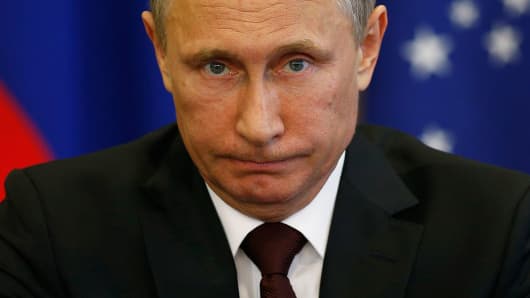As the guns fell silent in eastern Ukraine on Friday, albeit briefly, hope resurfaced (yet again) that this could finally be the denouement of Russian aggression against its neighbor. However, such an assessment is mistakenly based on the same 20th century thinking that analysts and pundits have used to characterize Russian President Vladimir Putin as an anachronistic leader still fighting the Cold War and seeking to expand Russia's territory. In fact, the Ukraine crisis is as much a modern economic conflict as it is a traditional military one, if not more so. And Putin is doing a better job than his Western counterparts of incorporating economic and financial considerations into his strategy.
Many Western analysts and leaders, including German Chancellor Angela Merkel, describe Putin as "unpredictable," but this, too, is based on a misreading of his ultimate objective, which is quite clear — Putin seeks pliant regimes that subjugate themselves to Russia's interests in the former Soviet states surrounding Russia, which he has long called "the near abroad."
Read MoreOp-ed: Anger is not a strategy
Putin prefers to use carrots rather than sticks to accomplish this aim, as demonstrated by the discounted gas and financing he provided Ukraine before President Viktor Yanukovych was ousted and fled to Russia.
But Putin has no compunction about using sticks if necessary. And when he does, he makes sure that they are pointy. Yet he is not employing military force in Ukraine for the primary objective of seizing territory, at least not beyond the strategic port he gained in Crimea. Rather, Putin is using the (pro-)Russia rebels principally to keep Kiev politically and economically weak.
Meanwhile, the European Union and United States have sought to counter Putin's intimidation through targeted sanctions. They believe that Russia will eventually succumb to economic pain, which, in theory, may be true. The problem is that, in practice, the West is unwilling to inflict sufficient pain to effectively test this thesis out of concern for the adverse consequences to their own economies.
Read MoreNATO agrees cyberattack could trigger military response
The Europeans, in particular, fear that provoking an escalation will result in an interruption of Russian gas exports, particularly in light of the euro zone's heightened deflationary pressures. This is no doubt a legitimate concern. As the old adage goes, "If the Russian bear sneezes, Germany catches a cold." This is why even the EU's latest expanded list of sanctioned firms excludes Gazprom, Russia's state-owned gas monopoly. And this is also why the EU and U.S. have only blocked Russia's large state-owned banks from accessing Western capital markets, but still allow them to conduct daily business worldwide otherwise unimpeded.
Sometimes, though, conflicts are not zero-sum, turning rather on the question of who suffers more relative to their respective pain thresholds. Europe could turn Russia's economic weapon of choice back against itself by restricting gas imports while America effectively cuts off Russia's banking system from the global economy by sanctioning its largest banks. These combined actions would be certain to plunge Russia immediately into a deep recession and are the only real chance for the West realistically to shape Putin's behavior. Germany, France, and Italy, among others, will not allow it to happen though.
Read MoreOp-ed: WWII flashback: Is history repeating itself?
With the West's response thus bound within these given limitations, Putin is free to continue to intimidate Ukraine without impunity. Ultimately, Putin wants to cause the Ukrainians to become disgruntled with their own political leadership, leading President Petro Poroshenko either to capitulate to Russia's demands or be replaced by someone who will. Russia's military action is just a means to an end in this regard.
When Russia invaded Georgia in August 2008, it became quickly evident to those of us working on that crisis in the Treasury Department that Russia's aim was not to re-take Georgia physically, but to break it economically. Russian forces blocked Georgia's main transit artery, seeking to choke off commerce and cause a domestic political backlash sufficient to depose President Mikheil Saakashvili with a Georgian leader more attuned with Russia's interest. What is happening now in Ukraine is no different.
Of greater impact than the latest incursion by Russian forces into eastern Ukraine or the following cease-fire is that Ukraine's currency, the hryvnia, has been plumbing new lows in recent weeks, and Ukraine does not have the luxury of extensive foreign- exchange reserves that Russia enjoys. Although the perceived threat of a full-scale Russian invasion may recede as winter approaches, the real threat of Russia shutting off gas to Ukraine — a customer that is not generally paying its bills anyway — becomes greater as the temperatures in the region start to drop in the months ahead.
In short, while a lasting cease-fire would be a welcome relief for the innocent civilians suffering in eastern Ukraine, investors should not take it as a sign that the conflict is coming to a resolution. On the contrary, as the weather cools down, the economic conflict is likely to heat up.
Commentary by Stephen A. Myrow, managing partner of Beacon Policy Advisors LLC, an independent policy research firm based in Washington, DC. He has served in various government roles, including as a senior Treasury Department official in 2008-2009. Follow him on Twitter @smyrow.


